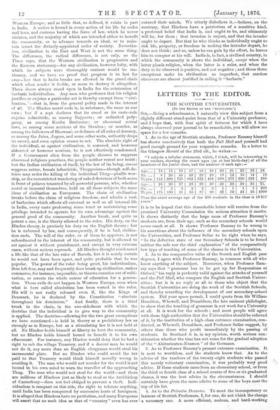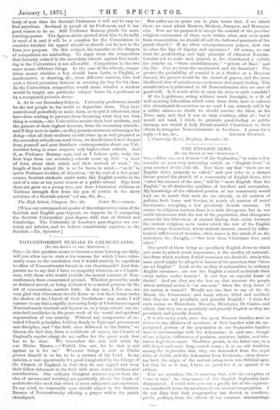LETTERS TO THE EDITOR.
THE SCOTTISH UNIVERSITIES.
(TO THIS EDITOR OF THE "SPECTATOR."]
SIB,—Being a schoolmaster, I naturally view this subject from a slightly different stand-point from that of a University professor, and I hope that, with that spirit of fairness for which I have always observed your journal to be remarkable, you will allow me space for a few remarks.
1. As to the age of Scottish students, Professor Ramsay himself has shown conclusively that both the Pall Mall and yourself had good enough ground for your respective remarks. In a letter to the Glasgow Herald of the 23rd ult., he writes :— " I subjoin a tabular statement, which, I think, will be interesting to your readers, showing the exact ages (as at last birth-day) of all the members of the junior class, and the number of each age :—
Age ... 14 15 16 17 1 18 19 20 21 22 1 23 24 No. ... 8 20 45 891 29 26 19 13 10 14 IC T1. yrs. 112 300 720 663 1 522 494 380 273 220 322 24C Ago ... 25 26 27 28 29 30 32 88 84 85 I TL No. ... 7 5 3 21 3 3 1 1 1 1 260 Tl.yrs. 175 130 81 56 1 87 90 32 38 84 85 4998 Thus the exact average age of the 260 students in the class is 19.207 years."
It is to be hoped that this remarkable letter will receive from the promised University Commission the serious attention it merits. It shows distinctly that the large mass of Professor Ramsay's students are, from their age, such as the secondary schools would never reach at all. It shows Professor Ramsay to be wrong in his assertions about the influence of the secondary schools upon the Universities, and Professor Sellar to be right when he says, "In the defective state of our Secondary Schools is to be found neither the sole nor the chief explanation" of the comparatively low type of teaching of some of the classes in the Universities.
2. As to the comparative value of the Scotch and English pass degrees, I agree with Professor Ramsay, in common with all who know anything of the subject. Moreover, when Professor Ram- say says that " grammar has to be got up for Responsions at Oxford," his reply is perfectly valid against the attacks of yourself and the Pall Mall, who compare the English and Scottish Univer- sities; but it is no reply at all to those who object that the Scottish Universities are doing the work of the Scottish Schools, and thereby retarding the development of our secondary-school system. Did your space permit, I could quote from Sir William Hamilton, Whewell, and Donaldson, the late eminent philologist, to show that the teaching of grammar is not work for a University at all. It is work for the schools ; and most people will agree with these high authorities that the Universities should be relieved of it, by the institution of a high-class entrance examination, con- ducted, as Whewell, Donaldson, and Professor Seller suggest, by others than those who profit immediately by the passing of students. In Scotland it is, in my opinion, worth serious con- sideration whether the time has not come for the gradual adoption of the " Abiturienten-Examen " of the Germans.
3. As to Professor Ramsay's present entrance-examination. It is next to worthless, and the students know that. As to the advice of the teachers of the twenty-eight students who passed this merely voluntary examination, it was probably very good advice. If these students came from an elementary school, or from the third or fourth class of a school course of five or six graduated classes, it was the best advice in the circumstances. I should certainly have given the same advice to some of the boys near the top of his list.
4. As to the Privatim Docentes. To meet the incompetency or laziness of Scottish Professors, I, for one, do not think the change a necessary one. A more efficient, zealous, and hard-working body of men than the Scottish Professors it will not be easy to find anywhere. Scotland is proud of its Professors, and it has _good reason to be so. Still Professor Ramsay pleads for more teaching-power. The figures above quoted show him to be sadly in need of it, and it will be a question for the Commission to consider whether his appeal should or should not be met in the form you propose. On this subject, his remarks on the dangers of competition are misleading. To argue from the competition that formerly existed in the secondary schools against free teach- ing in the Universities is not allowable. Competition in the two cases means different things. In the case of the schools, compe- tition meant whether a boy should learn Latin, or English, or mathematics, or drawing, &c., from different masters, who had each a direct pecuniary interest in securing the boy for his class. In the Universities, competition would mean whether a student would be taught one particular subject better by a professor or by a recognised privatim docens.
5. As to our Secondary Schools. University professors should be the last people in the world to depreciate them. They have contributed powerfully to make them, or to put it otherwise, they have done nothing to prevent them becoming what they are. One thing is certain,—the Universities receive their best students, and the gainers of their highest honours, from the secondary schools ; and if they were to insist—as they possess enormous advantages for doing—that all their students should come up as well prepared as the secondary schools can send them, we should have fewer charges from yourself and your Southern contemporaries about our Uni- versities being in some respects only higher-class schools. And If, as Professor Ramsay says, and as I believe quite truly, the best boys from our secondary schools come up with " a want of form about their minds and their method of work," the length of their school life is to be borne in mind,—" as if," to -quote Professor Geddes, of Aberdeen, "at the end of a five years' course, Scottish students could write like English youths at the .end of a nine or ten years' course at a public school. Ripe fruit does not grow on a young tree, nor does Ciceronian richness or Tacitean strength flow from the pen of youths in the short _novitiate of a Scottish schooL"—I am, Sir, &c.,
The High School, Glasgoir, Dec. 28. JOHN HUTCHISON.
[When our correspondent speaks of the comparative value of the Scottish and English pass-degrees, we suppose he is comparing the Scottish Universities' pass-degree with that of Oxford and 'Cambridge. The University of London's pass-degrees are cer- tainly not inferior, and we believe considerably superior, to the Scottish.—En. Spectator.]











































 Previous page
Previous page